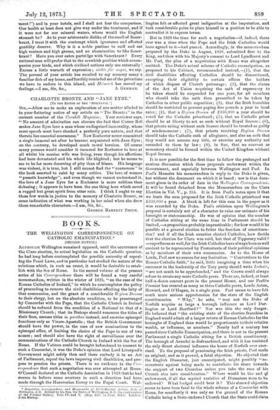'CHARLOTTE BRONTE AND "JANE EYRE." [TO THE EDITOR OF THE
"SPECTATOR."] "SIR, —Allow me to make an explanation of one matter alluded to in your flattering notice of my article on "The Brontiis" in the onrrent number of the Cornhill Magazine. Your reviewer says, 44 No amount of admiration can obscure the fact that Currer Bell makes Jane Eyre love a man whose undisguised immorality, whose mere speech must have shocked a perfectly pure nature, and that therein lies essential coarseness." Now Rochester never committed a single immoral act after he became acquainted with Jane Eyre ; on the contrary, he developed much moral heroism. Of course many persons would consider it immoral for Rochester to love at all whilst his maniac wife was living, even though his affections had been devastated and his whole life blighted ; but he seems to me to be far more deserving of pity than of blame. His language was violent, it is true, but I still cannot find the "coarseness" in the book asserted to exist by many critics. The love of woman " passeth knowledge"; and even though we cannot understand it, the love of a Jane Eyre for a Rochester is more sublime than debasing; it appears to have been the one thing here which saved a rugged but great spirit from utter ruin. I think I ought to say these few words in justice to the memory of Charlotte Bronte, as -some indication of what was working in her mind when she drew ‘these remarkable characters.—I am, Sir, &c.,
GEORGE BARNETT SMITH.


































 Previous page
Previous page